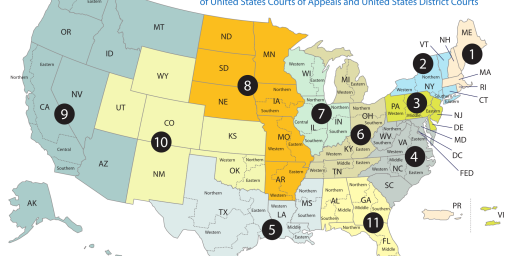Appeals Court Denies Federal Government’s Request For Stay Of Travel Ban Order
An initial setback for the Federal Government in its appeal of the ruling putting President Trump's Muslim travel ban on hold.
As expected, the Trump Administration filed its appeal of the order of a Seattle-based Federal District Court Judge halting the President’s order barring travel to and from seven majority Muslim nations last night. As a first step, though, they suffered a bit of a setback in that the Ninth Circuit declined to put Judge Robart’s ruling on hold pending appeal:
WEST PALM BEACH, Fla. — A federal appeals court early Sunday rejected a request by the Justice Department to immediately restore President Trump’s targeted travel ban, deepening a legal showdown over his authority to tighten the nation’s borders in the name of protecting Americans from terrorism.
In the legal back and forth over the travel ban, the United States Court of Appeals for the Ninth Circuit in San Francisco said a reply from the Trump administration was now due on Monday.
The ruling meant that refugees and travelers from seven predominantly Muslim nations — Iran, Iraq, Libya, Somalia, Sudan, Syria and Yemen — who were barred by an executive order signed by the president on Jan. 27 would, for now, continue to be able to enter the country.
After a Federal District Court in Seattle blocked Mr. Trump’s order nationwide on Friday, the Justice Department appealed the ruling late Saturday, saying that the president had the constitutional authority to order the ban and that the court ruling “second-guesses the president’s national security judgment.”
On Saturday night, as Mr. Trump arrived at a Red Cross gala at Mar-a-Lago, his waterfront Florida resort, where he was spending the first getaway weekend of his presidency, reporters asked him if he was confident he would prevail in the government’s appeal. “We’ll win,” he replied. “For the safety of the country, we’ll win.”
The legal maneuvering led Mr. Trump to lash out at Judge James Robart of the Federal District Court in Seattle throughout the day, prompting criticism that the president had failed to respect the judicial branch and its power to check on his authority.
In a Twitter post on Saturday, Mr. Trump wrote, “The opinion of this so-called judge, which essentially takes law-enforcement away from our country, is ridiculous and will be overturned!”
The Justice Department’s filing sought to have the United States Court of Appeals for the Ninth Circuit block the Seattle judge’s decision and asked that the lower court’s ruling be stayed pending the appeal.
n its argument for an appeal, the Justice Department had said the president had an “unreviewable authority” to suspend the entry of any class of foreigners. It said the ruling by Judge Robart was too broad, “untethered” to the claims of the State of Washington, and in conflict with a ruling by another federal district judge, in Boston, who had upheld the order.
The Justice Department argued that the president acted well within his constitutional authority. Blocking the order, it concluded, “immediately harms the public by thwarting enforcement of an Executive Order issued by the President, based on his national security judgment.”
Judge Robart, who was appointed by President George W. Bush, declared in his ruling on Friday that “there’s no support” for the administration’s argument that “we have to protect the U.S. from individuals” from the affected countries.
His ruling also barred the administration from enforcing its limits on accepting refugees. The State Department said Saturday that refugees, including Syrians, could begin arriving as early as Monday. Syrians had faced an indefinite ban under the executive order.
The Ninth Circuit court moved quickly to reject the administration’s appeal, a measure of the urgency and intense interest in the case.
Despite Mr. Trump’s vehement criticism of the ruling and the certainty that it would be appealed, the government agencies at the center of the issue, the State Department and the Department of Homeland Security, moved quickly to comply.
Lawrence Bartlett, the State Department’s director of refugee resettlement, wrote in a departmental email that officials were working to rebook travel for refugees who had previously been scheduled to leave for the United States over a three-week period that will end Feb. 17. A State Department official said the extended time frame accounted for the fact that some refugees will have to make difficult journeys back to airports from refugee camps.
A United Nations spokesman, Leonard Doyle, said about 2,000 refugees were ready to travel.
Airlines, citing American customs officials, were telling passengers from the seven countries that their visas were once again valid. Those carriers, however, have yet to report an uptick in travel, and there appeared to be no rush to airports by visa holders in Europe and the Middle East intent on making their way to the United States.
Etihad Airways, the United Arab Emirates’ national carrier, said in a statement: “Following advice received today from the U.S. Customs and Border Protection unit at Abu Dhabi Airport, the airline will again be accepting nationals from the seven countries named last week.” Other Arab carriers, including Qatar Airways, issued similar statements.
A group of advocacy organizations that had worked to overturn the executive order and help immigrants and refugees stranded at airports issued a statement on Saturday afternoon encouraging travelers “to rebook travel to the United States immediately.”
“We have been in contact with hundreds of people impacted by the ban, and we are urging them to get on planes as quickly as possible,” Clare Kane, a law student intern at the Jerome N. Frank Legal Services Organization at Yale Law School, one of the groups involved, said in a statement.
But some officials were being more cautious, advising travelers to wait for further clarity. The American Embassy in Baghdad said it was waiting for additional guidance from Washington. “We don’t know what the effect will be, but we’re working to get more information,” the embassy told The Associated Press in a statement.
What this means is that Judge Robart’s ruling remains in effect at least until the Ninth Circuit, or a high Court, rules otherwise. As an initial matter, though, I’d caution against reading too much into this particular decision as being indicative of where the Ninth Circuit might come down on the matter before it. All it really means is that the particular Circuit Court Judge or panel that was handed this case decided that it was best to keep Judge Robart’s order in place until both sides have been able to make their arguments to the Court. In that regard, the order that was released last night also provides that the reply from the attorneys from the Plaintiffs/Appellees is due today no later than 11:59pm Pacific time, and the reply from the Defendants/Appellants is due by 3:00pm on Monday. There hasn’t been a hearing scheduled in the matter yet, but assuming the Court wants one rather than deciding to rule initially based on the filings alone but given this schedule, it’s likely it wouldn’t be scheduled until late in the day on Monday or Tuesday morning. At least until that time, the order putting the travel ban on hold will remain in effect and hundreds, potentially thousands, of people will act in reliance upon that Order. The Ninth Circuit is no doubt aware of this fact, so the fact that they did not put Judge Robart’s ruling on hold is, if not necessarily indicative of how they may ultimately rule on the request to stay the Friday order. If the Court was inclined to conclude that Judge Robart was clearly wrong, for example, then it seems likely that they would have stayed his order in order to prevent people from acting in reliance on that order only to ultimately find themselves trapped inside or outside the United States.
In the meantime, the Federal Government has already previewed its argument in the motion it filed for an initial stay, and Buzzfeed’s Chris Geidner examines it:
In making their case for the stay, Justice Department lawyers wrote in a Saturday night filing, “The injunction immediately harms the public by thwarting enforcement of an Executive Order issued by the President, based on his national security judgment.”
In the brief, the Justice Department lawyers argue that the trial court’s order violates the constitutional separation of powers, harms the public “by thwarting enforcement of an Executive Order” in the areas of immigration matters and foreign affairs, and “second-guesses the President’s national security judgment” regarding admission of people to the US.
Regarding the particular circumstance of the lawsuit, brought by the state of Washington, the Justice Department argues that the state has no legal standing to bring the claim because Washington “is not itself subject to the Executive Order.” Even if it does, the Justice Department continues, the court’s order is too broad because it stopped enforcement of parts of Trump’s executive order “untethered to Washington’s particular claims.”
Although temporary restraining orders like that issued by Robart are not generally appealable, Justice Department lawyers argue this order should be appealable because there was an adversarial hearing — as in, both sides were there and presented arguments — and, they assert that the length of the injunction here is “indefinite.” As such, they argue, Robart’s order should be treated like a preliminary injunction, which would be appealable.
Whether the Ninth Circuit ultimately finds the Federal Government or the Plaintiffs to be more persuasive is something that only time will tell. In the meantime, we’ll just have to wait and see. If you want to follow the legal proceedings in this matter, the Court has set up a public access page that is available to the general public on which all of the current filings are available. Additionally, the Ninth Circuit has been known to allow some of its hearings to be lives-streamed over the Internet. The most high profile case this happened in was the hearing on the appeal of the case involving California’s Proposition 8, which overturned a State Supreme Court ruling mandating same-sex marriage statewide. If there is live-streaming of the argument here, I’ll post the details when they become available for anyone who might be interested.
Update: As noted in the comments, the panel that has been assigned to this case is made up of two Judges appointed by Democrats. Judge William Canby Jr., who was appointed by President Carter, Judge Richard Clifton, who was appointed by President George W. Bush, and Judge Michele Friedland, appointed by President Obama.
Here’s the Federal Government’s Emergency Motion:
Washington Et Al v. Trump Et Al Emergency Motion for Stay by Doug Mataconis on Scribd






TRO’s are not appealable as of right, so it is not that surprising that they denied the appeal. Preliminary injunctions are appealable as of right, but TROs are not. To get a TRO reversed usually requires extraordinary relief.
So I wouldn’t read too much into this.
The appeals court panel is said to consist of two liberals (Canby and Friedland) and one moderate conservative (Clifton). Clifton is more conservative than Judge Robart (who entered the TRO) while Canby and Friedland are probably even more liberal.
Robart, who issued the TRO against the executive order, is a fairly liberal Bush appointee appointed with the blessing of his state’s two Democratic senators, after being selected with other mostly non-conservative trial judges by a mostly liberal bipartisan commission that referred its picks to Bush. Robart is liberal on social issues, moderate on most other things.
As I indicated in my earlier post on another thread, the panel on this one is Canby, Friedland and Clifton (which is bad news for the administration).
The order was issued by Canby and Friedland (Clifton lives in Hawaii and will probably be flying in today if he hasn’t already). While Clifton is a pretty moderate Republican, Canby and Friedland (nobody has ever called these two conservatives) IMO just signaled their intent. 2 out of 3 is the ballgame.
There are legitimate arguments to be made about some of what DOJ is asserting in its pleading, but the administration drew quite possibly the worst panel it could have drawn for this one. Given the 4/4 split in place at SCOTUS and its own internally finite period of operation, it’s quite possible that this EO is dead in the water.
When I wrote above “denied the appeal,” I meant to write “denied a stay.” The larger issue remains pending before the appeals court, so in that sense, the appeal obviously remains pending and has not been denied.
Note also that judges’ votes in immigration cases do not always break down along party or ideological lines (although there is a statistical correlation between ideology and how judges vote in such cases).
@Passerby:
The larger issue remains pending before the lower court. Robert ordered both parties to brief on the states’ motion for a PI NLT tomorrow @ 1700.
I fully expect the panel to excise themselves from this mess by refusing to intervene in a matter which is still pending hearing before a lower court.
Don’t you mean a “so-called appeals court”?
The cynic in me says the appeals court will ultimately rule against the executive order 2-to-1, with the judges dividing along ideological lines.
But what their reasoning will be for striking down the executive order is unclear, because the trial judge provided absolutely no reasoning whatsoever for blocking the executive order. Other judges in Massachusetts and elsewhere found the executive order did not violate the Constitution, no matter how unwise Trump’s order may have been. Federal law gives the President broad discretion in these matters — even, alas, a President like Trump.
As law professor Josh Blackman pointed out in the New York Times, it is completely unclear even what constitutional provision the trial judge, James Robart, thinks was violated by the executive order, and his TRO does not explain that at all. Robart did not explain in the text of his order why he thought the Constitution was violated, and immigration law has long treated some countries very differently from other countries with no one viewing that as a constitutional violation.
But two of the three judges on the appellate panel are liberals, and they will likely affirm what Robart, their fellow liberal, did (as lawyers such as Paul Mirengoff have noted, Robart’s judicial record is quite liberal, overall, especially in areas that are racially-charged).
Given the understandable distaste for Trump, the judicial temptation will be to re-interpret executive authority over such matters more narrowly than Congress perhaps intended.
@Sam:
It’s not unclear at all. Blackman just doesn’t like it.
Robart quite clearly (IMO) indicated in his order his finding that the manner in which the EO attempts to direct enforcement of applicable federal statutes violates the implied equal protection clause contained in the 5th Amendment. Imposing limitations predicated on geography using the justification that certain regions comprise more of a security risk is capricious, especially when the assertions utilized to justify those geographic delimiters aren’t supported by the evidence.
Had the order directed that all prospective refugees be subjected to additional scrutiny predicated on the threat of a security risk, we most likely wouldn’t be having this discussion.
On reflection, I think HarvardLaw92’s prediction is correct:
“I fully expect the panel to excise themselves from this mess by refusing to intervene in a matter which is still pending hearing before a lower court.”
Whether or not that is the correct resolution (and I do not know whether it is, given how the TRO was framed), I suspect that is what they will in fact do. TRO’s, after all, are not appealable as of right.
@Passerby:
While there are always exceptions, I generally believe that appeals courts shouldn’t short-circuit civil process barring clear and demonstrable evidence of imminent, likely, and identifiable harm which would result if they failed to intervene.
DOJ is trying to effect an end-run around civil process simply because the executive doesn’t like the current situation on the ground with respect to the lower court. That’s not a sufficient rationale (IMO).
If Judge Robart’s TRO actually is predicated on such a silly and radical theory (geographic discrimination), then when he does turn his TRO into an appealable preliminary injunction, it will ultimately be reversed either by the appeals court, or the Supreme Court.
“Robart quite clearly (IMO) indicated… that the manner in which the EO attempts to direct enforcement of applicable federal statutes violates the implied equal protection clause contained in the 5th Amendment. Imposing limitations predicated on geography is capricious.”
The Supreme Court has long said that even basic equal-protection principles limiting discrimination by the government do not apply in the immigration context. And even if that were not true, geographic discrimination does not trigger heightened judicial scrutiny the way race or gender discrimination does, even in domestic legislation.
I had assumed that Judge Robart actually had a rationale for his TRO, but if what you say is true, he doesn’t.
Immigration law discriminates based on geography all the time. You can come to America without a visa from Hungary, but not from Poland.
Any such distinctions are subject either to rational basis review, or no review at all, depending on what legal scholar you ask. And rational basis review is a misnomer: as Chief Justice Rehnquist once noted, it is really little more than a sanity test, and does not require evidence, merely a non-crazy argument. Even in domestic legislation, that is clear under Supreme Court decisions like Williamson v. Lee Optical.
Under rational basis review, a challenged restriction doesn’t even need to be supported by evidence — although such evidence can help when the challenged restriction looks absurd on its face.
As lawyer Paul Mirengoff notes at Powerline, there is very obviously a rational basis for the executive order singling out these seven countries, which are all plagued by violence or support for terrorism. The countries not included have all have sound economic, diplomatic, or geopolitical reasons for not being included.
These are the same seven nations of concern identified in a 2015 law signed by President Obama.
Well there’s your problem. What “national security judgement?”
@Passerby:
Note: I went there precisely because it was more than evident that you were fishing for this debate 🙂
Again, the evidence on the ground – there have been exactly zero instances of the imminent harm which the EO attempts to use as its justification committed by immigrants originating in these seven countries – undermines the justification.
Immigrants from these seven countries, during the period from 1975 through 2015, killed exactly zero Americans in domestic terrorist attacks. Meanwhile, immigrants from just three countries – Saudi Arabia, the UAE and Egypt – comprise 94.1% of all domestic deaths attributed to terrorism, yet immigrants from these countries are not addressed in the EO.
So – we have refugees from seven countries with destabilized domestic situations (which makes sense, else whence cometh refugees in the first place?) which have produced exactly zero domestic terrorism deaths being singled out for denial of entry, while the few domestically stable (relative sense) countries which are, by far, responsible for the bulk of domestic terrorism deaths are not subjected to an entry bar.
The available evidence does not support the basic premise of the EO – that immigrants from destabilized regions present more of a security risk. It refutes it, which undermines any rational basis for having selected these seven countries to the exclusion of all others.
The EO’s problem is not that the basis on which it ostensibly seeks to limit immigration is invalid – it isn’t. They just picked the wrong sources to limit. The question that will almost certainly be pursued in the course of these DC proceedings will be a simple one – why were they selected?
And given that this is a civil matter, discovery with regard to the discussions which resulted in the order may prove to be most illuminating.
Digest that and then we can move on to the actual equal protection violation – which you completely sidestepped.
And then we can discuss the fact that the EO actually violates federal law as well.
You wanted the debate 🙂
The executive order does not violate equal protection through its geographic discrimination, since only rational basis review applies (as you seem to concede) and classifications can be quite underinclusive or overinclusive and survive rational basis review, as the Supreme Court made clear in cases such as Railroad Retirement Board v. Fritz.
Even if that weren’t the case, you can’t seriously expect the executive order to target Saudi Arabia, which has deep economic and security ties to the U.S., as other lawyers have noted. That would infuriate the Saudis, reduce their cooperation with us, and harm American business.
Do you really expect the executive order to throw away billions of dollars by blocking travel to and from Saudi Arabia?
Under rational basis review, the executive order doesn’t have to target all nations that produce terrorists, in order to target some of them: it can can target those nations that have the least economic or political ties to the U.S., while not covering those nations that don’t (even those, such as Saudi Arabia, that produce much larger numbers of terrorists).
It also makes no sense to cover Egypt merely because it produces some terrorists. It is a US ally, for the most part, and its population is so huge (nearly 100 million) that of course it produces at least some terrorists. That is a sign of its populous nature, not it being a terror mecca. And Egypt is a major export market, the way Yemen and Sudan are not.
Immigration laws constantly discriminate based on geography (you can come into the U.S. visa-free from Hungary but not Poland, for example), so the idea that that is a constitutional violation is a radical notion.
@Sam:
It’s pretty obvious what the possible reasons could be, since the Washington state attorney general has laid out the foundation for the case. Per the press release: “Ferguson argues that the Executive Order violates the U.S. Constitution’s guarantee of Equal Protection and the First Amendment’s Establishment Clause, infringes individuals’ constitutional right to Due Process and contravenes the federal Immigration and Nationality Act.”
The equal protection argument is a no-brainer. And Trump’s racist Islamophobic rants coupled with the utter absence of evidence of a security problem only serve to bolster the establishment clause argument. This is motivated by bigotry, not by a fair interpretation of the INA.
The equal protection argument is incredibly weak.
The seven countries covered by the executive order are the same seven countries covered by a 2015 law signed by President Obama (restricting visa waivers, etc.), although the executive order goes much further in restricting entry from those countries that that law did.
The Constitution does not ban geographic discrimination among foreign countries. Immigration law commonly so discriminates (people can come to America visa-free from one country, but not neighboring countries, even with similar per capita incomes — see Hungary and Poland, for example), and no one has ever suggested that doing so triggers heightened judicial scrutiny. Quite the opposite. And equal protection principles are at their nadir when it comes to border control. They do not even apply to aliens outside the United States.
If there is a valid argument against this executive order, it is not based on its geographic discrimination, as the judge who issued the TRO apparently believes.
@Passerby:
Interesting word salad – so your basic premise is that it is permissible for an EO which ostensibly seeks to protect against the risk of domestic terrorism to ignore countries which actually present a risk, while focusing undue attention on countries which demonstrably present little or no risk, because – dollars.
Good luck selling that one on the evening news.
Now, would you like to address the actual equal protection violation? (Nobody tell him what it is. Let him do his own homework).
You may phone a friend if you need to.
Yes, the executive order, dumb though it may be, easily passes rational basis review under the Constitution’s equal-protection component. Have you ever even read a Supreme Court decision involving rational basis review?
Almost any justification — cost or otherwise — permits discrimination under rational basis review.
Dollars certainly is a rational basis. The Supreme Court has said this many times (saving a few dollars in administering a program, for example, is a rational basis for discrimination based on a non-suspect classification).
The government is even allowed to save dollars through grossly underinclusive and overinclusive classifications, as the Supreme Court ruled in Railroad Retirement Board v. Fritz.
@HarvardLaw92:
Ironically enough, the administration has already answered that question: they were nations selected by the Obama administration–the incompetency of which created the need to launch this executive order in the first place.
@Passerby:
No, dear boy (or girl?) – the EO (explicitly) disadvantages certain groups while privileging others on the basis of religion.
Care to guess which standard of scrutiny is applicable to this particular section of the establishment clause?
Hint – it ain’t rational basis … 🙂
(I love it when 1L’s wander into the deep end of the pool).
@Just ‘nutha ig’nint cracker:
And that need is what, exactly? Please feel free to be concise in your response
The Executive Order quite permissibly prioritizes asylum claims of religious minorities, who are at greater risk of facing persecution. That is consistent with the aims of existing statutory law and treaties on refugees and asylum, which are designed to protect vulnerable minorities who need asylum, not members of the majority who don’t.
That is not a violation of the establishment clause, any more than granting damages to African-American employees who have been subject to discrimination is itself racial discrimination, or accommodating free exercise of religion is an establishment (see Cutter v. Wilkinson).
Would you really argue that the government should ignore the fact that Yazidis and Christians have been subject to mass murder or genocide in Iraq and Syria, while members of other groups have not?
The Order does not preclude Muslims from seeking asylum when they are religious minorities. If a Muslim minority were at risk of genocide (such as Ahmadi Muslims in Pakistan persecuted as heretics, or Druze or Alawites), its terms would apply to them as well.
Thus, it does not establish Christianity as a preferred religion.
@Passerby:
You left out a part:
Considering religious persecution is absolutely permissible, but privileging minority religions has no permissible purpose which is not already considered within the context of the claim of religious persecution itself. The EO, as written, prioritizes SOME religious persecution claims over others. Taken in the context of the majority Muslim nations with which this EO concerns itself, Trump’s own prolific statements about “Muslim bans”, and the ostensible threat of domestic terrorism which it purports that those nations represent , it becomes quite clear that the intent is to prioritize Christian asylum seekers over others (unless you know of some wave of Buddhists seeking asylum that I’m unaware of).
On a textual and structural level, the order distinguishes between refugees on the basis of religion. That is a great big no no.
@Passerby:
Which also leads us to our next question: what happens to claims filed by atheists living in these countries who are seeking asylum from being persecuted due to their LACK of religious faith?
Do you assert that atheism is a religion within the context of this order?
While you’re furtively Googling that, add 8 USC 1152 to your reading list. We’ll be discussing that one as well.
(just for entertainment purposes – would you mind letting us all know which right-wing blog link led you here to this obscure little corner of the internet? I’ve been curious about that for a few days now, ever since the Im-Ho-Tep’ers started showing up out of nowhere.)
@Just ‘nutha ig’nint cracker:
Kellyanne Conway famously invoked the fictitious Bowling Green Massacre so that she could use the fictitious Iraqi ban that supposedly followed to justify Trump’s ban. Is this going to be a running thing in the Trump administration? We’re going to reverse everything Obama did, and it’s OK because Obama did the same thing we’re doing? (Insert Twilight Zone theme here.)
@Passerby:
“…you can’t seriously expect the executive order to target Saudi Arabia, which has deep economic and security ties to the U.S., as other lawyers have noted. That would infuriate the Saudis, reduce their cooperation with us, and harm American business.
Do you really expect the executive order to throw away billions of dollars by blocking travel to and from Saudi Arabia?”
Then the justification for blocking the citizens of the effected nations is political and not national security.
@Sleeping Dog:
And, let’s not forget that Trump has significant financial interests in Saudi Arabia.
As noted on the TheHill website and blog:
@gVOR08: Makes perfect sense to me; then again, I AM an ign’int cracker. (I can’t even spell “ign’int” on my name slot correctly.)
@HarvardLaw92: Okay, I can see that my snark attachment is out of adjustment.
@Just ‘nutha ig’nint cracker:
Sorry, I was in shred mode and it bled over. We really do need a snark font around here 🙂
@al-Ameda:
Yup, this EO is nothing but security theater for the rubes.